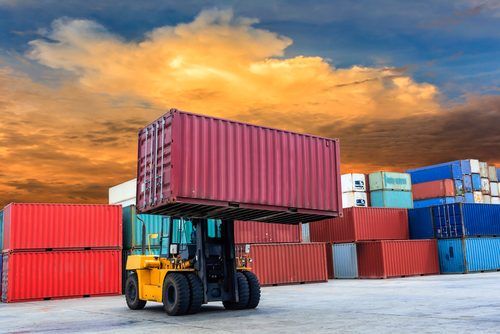December 04, 2014 | Industry Insights
IMO Mandates Weighing Loaded Containers Before Boarding

IMO Mandates Weighing Loaded Containers Before Boarding
The International Maritime Organization says loaded containers will have to be weighed before being boarded onto ships for sea transport. The determination was made by the IMO Maritime Safety Committee at its November 17-21, 2014, meeting in London and becomes effective June 1, 2016.
The verified weight of containers can be determined either by weighing the loaded container at an approved weigh station or by compiling the weights of individual items and adding their total combined weight to the net weight of the empty container. Dunnage would also have to be weighed. Incorrect data could result in container stacks collapsing, containers falling overboard, or accidents due to overloading.
In July, speakers at the Women’s International Shipping & Trading Association-UK Liverpool Forum said insurers estimate about 20% of containers shipped on the ocean and over highways are overweight—“an accident waiting to happen.” Overweight containers cause losses on the financial, human and environmental fronts. Problems include instability, fires and crashes, the speakers said.
Parties that trade goods have been pushing back on weighing standards, however. They argue weighing 100% of containers before boarding isn’t feasible or necessary and could add $5 billion a year to international commerce costs. But maritime mediator and arbitrator Ken McLean noted on a panel at the WISTA-UK forum that containers regularly tip to a 30 degree angle, making the point that improper stacking due to inaccurate weights could spell disaster.
An analysis leading up to the IMO weighing-mandate proposal indicated that 5% of 125,000 containers reviewed were “dangerously eccentric,” some weighing up to 80 tons.
The IMO mandates for 2016 may increase safety, but they are also expected to create backlogs at ports. Rogue containers and those with misdeclarations could put additional pressure on ship officers to expeditiously accept cargo even if they suspect it has been wrongly described, a practice afflicting the industry worldwide, according to one supply chain manager who spoke at the WISTA-UK forum.
Weighing containers before they arrive at port has been floated as a solution to potential terminal backlog problems. Reports out of the IMO meeting did not specify details about protocols, so that will be something to keep an eye out for as processes are developed in line with the new mandates.
At Roanoke Trade, we are always on the lookout for solutions to your shipping needs, and that includes safety as well as preventing costly delays at terminals. Our insurance products are designed to help you in the instance of loss, but our professionals are here to assist you with risk management plans intended to avert losses in the first place. Making a false declaration on a container or accepting suspicious cargo could make you liable for a catastrophically expensive accident. As the IMO begins its press forward on container weighing, it would be wise to revisit your container-weight protocols to make sure you are ready to comply come June 2016.
Let’s also work together to help you understand your policy coverage for container cargo and for compliance violations. Remember that your cargo could become the victim of other companies’ weight-related container failures and that the culprits might not be adequately insured, in which case you might need to rely on a cargo policy endorsement (an amendment to the standard insurance policy). Your Roanoke insurance professional can help you assess these needs and more.
We invite you to learn more about us, our experienced talent in this highly specialized area, our creative solutions, and the value we will bring to you and your clients. Please contact us at 1-800-ROANOKE.
Sources: The Maritime Executive, Ukhaulier













